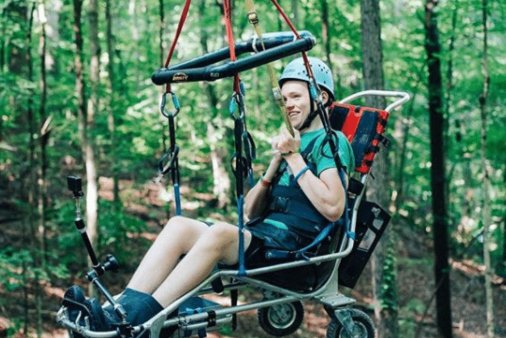
When a person becomes spinal cord injured, it’s one of the most traumatic situations they’ll ever face. Paralysis, pain, and other life-changing physical side effects definitely play a part. However, after a spinal cord injury (SCI), people will experience mental and emotional side effects as well, including PTSD (post-traumatic stress disorder), depression, and anxiety.
I went through all this after my spinal cord injury, and I’ve learned some helpful tips for coping and moving forward.
The 5 Stages of Grief After a Spinal Cord Injury
After sustaining a spinal cord injury, receiving a serious health diagnosis, or losing a loved one, people usually go through a process known as the 5 stages of grief, based on Elisabeth Kübler-Ross’s findings in her book, “On Grief and Grieving.”
The 5 Stages of Grief, also known by the acronym DABDA, are:
- Denial
- Anger
- Bargaining
- Depression
- Acceptance
Denial
In the first stage, after hearing the news they may never walk again, many people won’t believe or accept it. Denial is a way to delay confronting the truth of the situation.
On January 19, 2015, when I woke up in the hospital after my spinal cord injury, it didn’t bother me when they gave me the news that I was not able to walk. Even after I spent 30 days at a trauma center and 29 days in a rehabilitation hospital, I still remember thinking that I was going to be able to walk out of rehab when I left. However, that was when I knew nothing about having a spinal cord injury. Needless to say, I left rehab in a wheelchair. I kept thinking it would just take a little longer for me to be able to walk.
Anger
Once the reality of the situation settles in, the second stage begins. Injured people may lash out at others around them, like doctors who deliver the news about their SCI. Others may direct their anger at themselves and internalize it. This stage is when many people also start to question their personal belief system. They feel rage about how this could happen to them.
After a spinal cord injury, it almost feels like there’s nothing left to hold on to anymore. The anger almost pulls you back into your body, and it gives you something to grab onto and fight for. While anger may seem like a negative stage, it’s all part of the process.
Bargaining
The third stage begins when the injured person starts to understand the reality of what has happened to them. However, at this point, they’re still not ready to accept it. They often still hold onto false hope that the outcome of their injury can be changed. For example, an individual injured in a drunk driving accident may pray and think, “If God will heal me, I’ll never drink alcohol again.”
In other words, during the bargaining stage, the person may believe that they can return to their previous able-bodied life before their injury.
Depression
After realizing that bargaining will not change anything, depression sets in. This is often the longest stage in which people begin to feel hopeless once they fully understand that their injury cannot be undone. They may blame themselves or others and spend long periods of time grieving and thinking about their life before the injury. They may wonder what is the point of going on living, and feelings of worthlessness and thoughts of suicide may pop up. After all, it’s incredibly hard to transition into a body that doesn’t function or feel the same way it did before the spinal cord injury.
Support from friends and family is crucially important during this stage. After suffering a spinal cord injury, people need to know they are still loved and cared for, and most of all, they need to know they don’t have to face it all alone.
My injury started affecting me mentally once I got home and was back in a familiar environment. This is when I realized that I couldn’t get dressed, shower, or do much at all independently. The lowest point in my life was one year after my injury, in January 2016, when people were coming by my house to visit less and less. I realized that this was going to be my new way of life, and I didn’t want to accept it. I wanted to sleep as much as I could, and I got frustrated every time I woke up and had to face reality again.
Acceptance
The fifth and final stage of grief is acceptance. This is when people realize that the situation is not going to change. In addition, many people in the acceptance stage also seek to find meaning in their injury and in their new life as a person living with an SCI.
Because everyone is different, these stages are reached at different times. There is no set timeline for grief. You must go through the stages as they occur. However, you have options for help and ways to cope as you go through these stages and the process of grieving.
Tips for Coping After a Spinal Cord Injury
Recovery after a spinal cord injury is a long process physically, mentally, and emotionally. Some days are harder than others. You may go back and forth between stages of grief. Some days, even after you’ve fully accepted your injury, you may feel angry or depressed again on certain days. That’s totally normal. Personally, I still go through days where I don’t want to deal with the reality of my situation, and I want a break from it, too. When I get down on those days, I have a few tips I’ve learned for coping.
Set goals for yourself.
One thing I like to do is set a new goal for each day. Additionally, I set monthly and yearly goals to achieve. For instance, a new daily goal could be to learn something new that day, such as learning how to put on my socks by myself. Sometimes, I set a daily goal to research an aspect of my spinal cord injury that I don’t know much about.
Goals like these have become honestly kind of fun, and it’s a healthy challenge that is achievable. Whenever I figure a new task out or learn something I’ve never found out before, it’s such a great feeling of accomplishment. It feels like I am competing with my spinal cord injury, and any goal I achieve is a battle I win over my injury.
 Keep your mind occupied.
Keep your mind occupied.
When I’m feeling down and I let my thoughts wander off, I can quickly go into a downward spiral of negative thoughts. For example, sometimes I might start thinking things like, “Why did this happen to me?”
It’s a good idea to find something that can keep your mind occupied and engaged in the present moment. Just a few ideas include meditation or deep breathing exercises, taking up a new hobby, watching TV or movies, playing video games, or reading or listening to books. You may end up discovering a new passion that you love!
Join a support group.
One of the top things that helped me was finding a support group. Support groups give you the chance to talk with others who are in a similar situation as you. This helps you feel comfortable talking about any issues.
Personally, I live in a rural town, so there aren’t any in-person spinal cord injury support groups near me. However, someone told me about the Spinal Cord Peer Support USA Group on Facebook, which is a large group of people living with SCI, as well as their family members and loved ones. Plus, you’ll find doctors, nurses, and therapists there as well. Currently, over 11,000 members contribute to this online support group, and I highly recommend you join us there.
Find something to look forward to and live for.
Lastly, one of the most important ways to cope after your spinal cord injury is to find things to enjoy, look forward to, and live for. This really helped me through my hard times. For example, you might look forward to going back to school to learn something new and achieve a degree. Other ideas might be scheduling a regular dinner night with friends at your favorite restaurant or reserving tickets to an upcoming movie release you want to see.
On top of that, consider trying out some new hobbies. If you were active before your injury, you may still be able to enjoy physical activity. Thanks to adaptive sports like wheelchair basketball and handcycle racing, people all over the world stay active with their SCI.
 If you aren’t athletic, maybe you’d like to volunteer at a local organization or charity. Helping people and doing something with a purpose can really change your outlook on life.
If you aren’t athletic, maybe you’d like to volunteer at a local organization or charity. Helping people and doing something with a purpose can really change your outlook on life.
For me, I have found joy in creating helpful videos about living with quadriplegia on my YouTube Channel. I keep up with my favorite hobbies, and I also went back to school and got a job. Currently, I’m working toward my Bachelor’s degree in Information Technology. If I can do this even with my level of spinal cord injury, you can too!
I’d also like to share that during my hardest times, a trusted friend with a similar level of injury to mine shared a Bible verse with me, Jeremiah 29:11. “For I know the plans I have for you, declares the Lord, plans to prosper you and not to harm you, plans to give you hope and a future.” When I read that verse, I felt something I’d never felt before across my whole body. I knew that feeling must be God. Since that day, I haven’t had as much difficulty dealing with my injury. That was what really turned things around for me, and my belief in God is what drives me every day.
Life with a Spinal Cord Injury is Worth Living
I know first-hand how hard the process of recovery after a spinal cord injury can be. Life can be rough for just about anyone living in this crazy world, whether they’re injured or ill or not. However, I think there is a point to every single moment, whether we believe it some days or not.
Ultimately, life is short. The best thing to do is experience as much as you can in the time you are here. Despite your spinal cord injury, I believe you are still meant for great things. Believe in yourself, too!